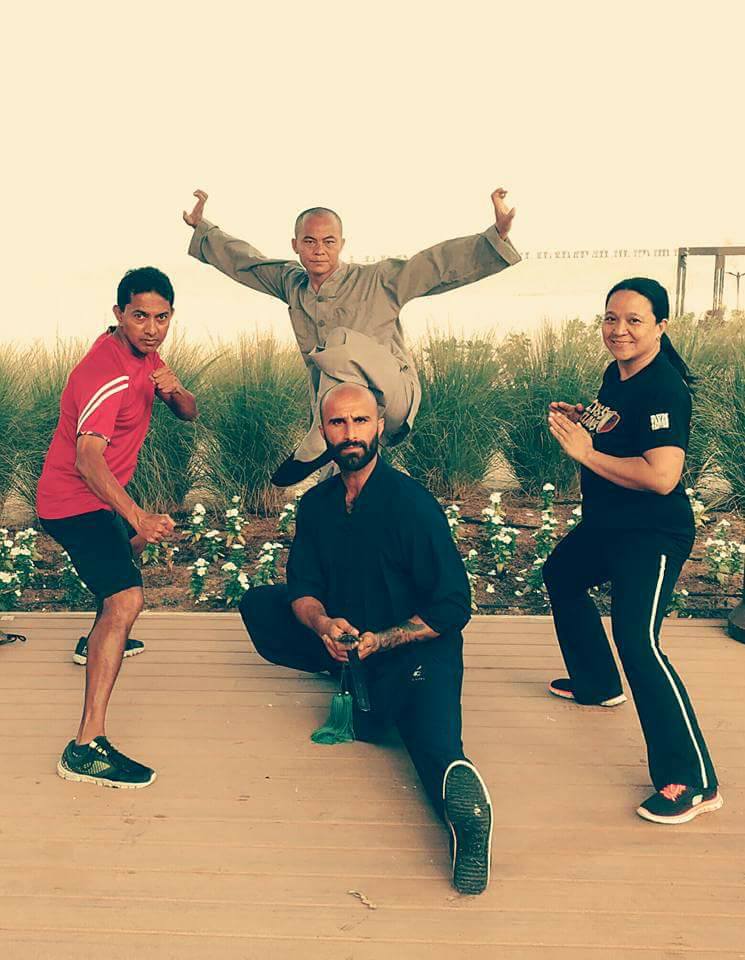TOP IMAGE: “Practicing with Master Wang, a 32nd generation disciple of the Shaolin Temple, was a profound experience. His teachings added a new level of authenticity and respect to my martial arts journey. Grateful for this invaluable lesson!”


In the vibrant world of martial arts, Shotokan karate stands out as a powerful and disciplined practice. Its roots trace back to Japan, but today it flourishes globally, including in Sri Lanka, where it has gained a dedicated following under the guidance of esteemed masters like Daya Samarasekara.
I began my own journey in karate in 1982, growing up in a village beside the renowned Mahaweli River in the Pallakele area of Kandy. As a seven-year-old, I was fortunate to observe my father and uncles practicing karate, a discipline that was not well-known at the time and often conducted in secrecy. For us, karate was more than just a sport; it was a way of life that instilled a warrior’s mindset.

7th Dan Karate (Japan)
6th Dan Kick Boxing (W.U.M.A England)
President & Chief Instructor Japan Karate-Do Kembukai Sri Lanka
Founder & Director Sri Lanka National Karate Organization
Vice President & Discipline Committee Chairman Sri Lanka Karate-Do Federation
Chief Karate Instructor: Sri Lanka Army / Sri Lanka schools Karate Do Association
Official Referee W.A.M.C (Denmark)
Training under Master Daya Samarasekara, the Chief Karate Instructor of the Sri Lanka National Karate Organization, was a privilege that shaped my path. His influence extended beyond the dojo, as he also served as the chief instructor for various military academies and is recognized as an All-Island Justice of Peace. Under his guidance, I continuously attended classes led by K.P.D. Susantha Perera, achieving my Black Belt and winning several national championships in both kata and kumite.
The essence of Shotokan karate lies in its ability to transform lives. Training involves mastering fundamental techniques—each punch, kick, and block meticulously practiced to cultivate discipline. This discipline transcends martial arts, teaching the importance of consistent effort and dedication. Overcoming challenges in training fosters perseverance, a quality invaluable in every aspect of life.
Respect and humility are central to karate’s ethos. The dojo serves as a microcosm of society, where students learn to honor their instructors and peers. This mutual respect fosters a community spirit that extends beyond the dojo, influencing how practitioners interact with the world.
As practice deepens, the focus shifts from technique to understanding karate’s underlying philosophy. This journey of self-discovery extends beyond the dojo, encouraging mastery of one’s emotions and the development of self-awareness and confidence. With these skills, individuals are empowered to face life’s challenges with clarity and resolve.
The lessons learned in karate permeate every aspect of life. The discipline translates into effective time management and goal-oriented living. The perseverance cultivated in training becomes a tenacious attitude toward overcoming life’s hurdles. Self-awareness and confidence gained through practice forge a strong personal identity, enabling individuals to navigate life’s ups and downs with grace and resilience.

For dedicated practitioners, the quest for excellence is a lifelong pursuit. There is always a new technique to perfect and deeper insights to attain. This commitment to continuous learning keeps the mind agile and the spirit young, transforming the pursuit of self-betterment into a lifelong mission.
“Never hurt the innocent but destroy enemies even without thinking of them. Power is not a blessing; it’s a learned skill to protect the innocent.” – Palitha Ariyarathna
Written by Palitha Ariyarathna, Author Publisher | Certified Karate Instructor and Boot Camp Specialist
Bio: Palitha Ariyarathna combines over two decades of professional expertise in martial arts, fitness, and aquatic adventures. As a certified Karate Instructor, he instills discipline and self-defense skills. His experience as a Boot Camp Specialist is complemented by his proficiency as a Scuba Diver and Swimming Instructor, where he dives into the depths of aquatic training. Palitha’s passion for adventurous water sports adds a splash of excitement to his comprehensive fitness programs. His holistic approach ensures readers gain insights into physical health, mental resilience, and the thrill of water sports.

(B.D.F.S)
Black Belt First Dan
Your own karate journey, regardless of experience level, holds the potential for personal enrichment. Embrace the challenges, celebrate the triumphs, and let the wisdom gained in the dojo enhance your life in every way imaginable. Step onto the mat and allow the transformative power of karate to guide you on a path of continuous growth and discovery.
Breaking (martial arts) Breaking is a martial arts skill that is used in competition, demonstration and testing. Breaking is an action where a martial artist uses a striking surface to break one or more objects using the skills honed in their art form. The striking surface is usually a hand or a foot, but may also be a fingertip, toe, head, elbow, knuckle, or knee. The most common object is a piece of wood, though it is also common to break bricks or cinder blocks. Technique In general, breaking is used both as a method of measuring force of strikes for martial artists, as there was no other way to do this and only recently have devices such as accelerometers been used in martial arts, and as a measurement of mental fortitude, the ability of the mind and body to overcome.

